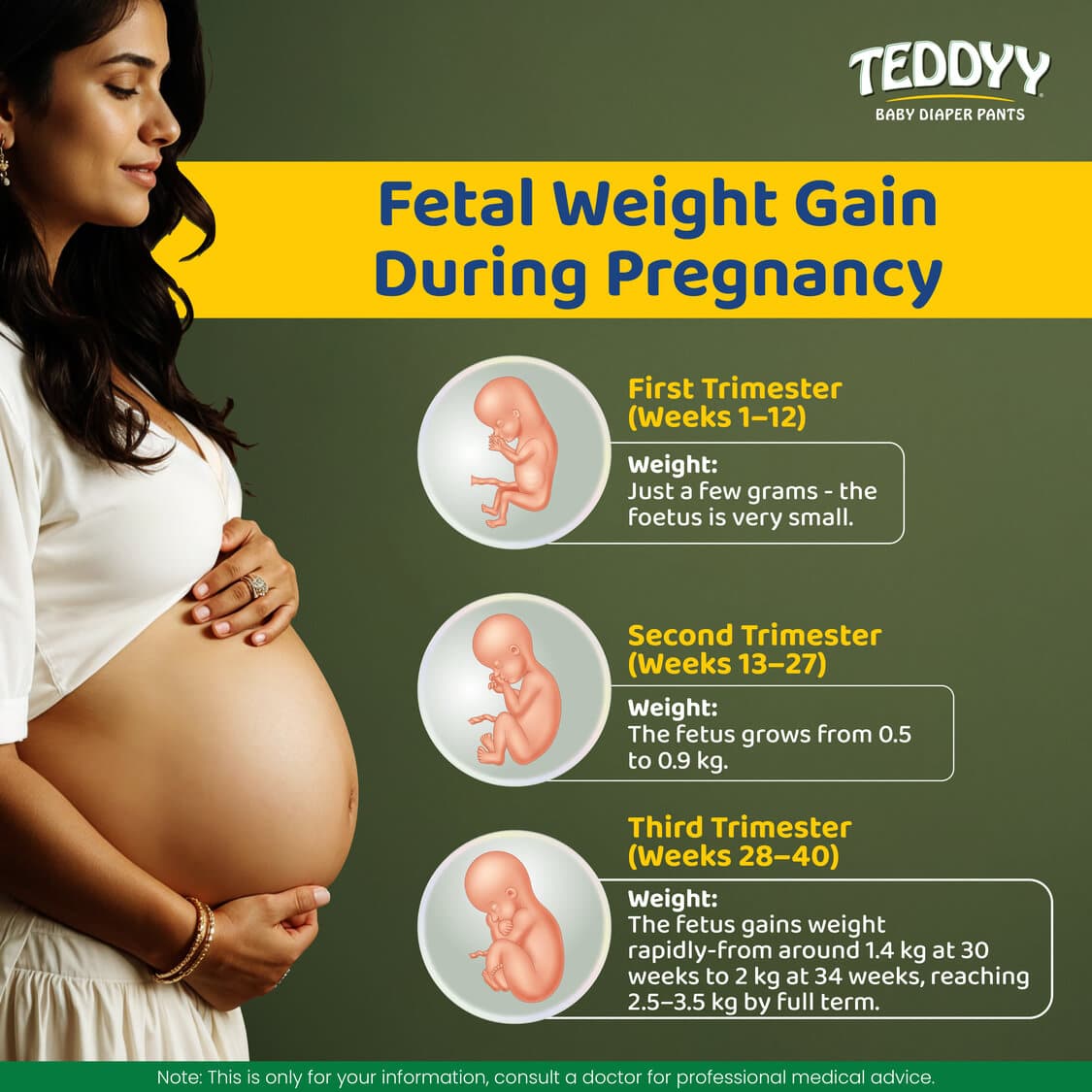Fetal Weight Chart in Grams & Kg: A Comprehensive Guide
UNDERSTANDING FETAL WEIGHT
Do you want to know how much your baby weighs in your belly? Well, ultrasound is a technique that lets you see your little one’s development in real time! Your doctor will use this to take several measurements, including head circumference, femur length, biparietal diameter, abdominal circumference, and crown-rump length, to assess fetal growth and estimate gestational age. These biometric parameters are measured to determine if the fetus is growing appropriately for its gestational age. All these numbers are then plugged into a special formula to calculate the estimated fetal weight. No need to worry about the formula itself (your doctor’s got that covered!).
We’ve included a handy fetal weight chart in grams below to give you an idea of how your baby is growing compared to what’s expected at each stage.
FETAL WEIGHT CHART IN GRAMS
Below is a fetal weight growth chart in grams based on the gestational period (the time between conception and birth). This chart provides average weight measures for each week of gestation and helps compare a fetus’s weight to a reference range. The growth chart is based on population reference ranges and is used to assess whether fetuses are within the expected weight range for their gestational age. During the first trimester, crown rump length is often used to estimate gestational age before fetal weights can be reliably measured, as it’s hard to predict the fetus’s weight before 8 weeks of gestation since they are too small. A fetus of up to 26 weeks is usually under one kilogram.
| Gestational Period | Fetal Weight in grams |
| 8 Weeks | 20 grams |
| 9 Weeks | 27 grams |
| 10 Weeks | 35 grams |
| 11 Weeks | 45 grams |
| 12 Weeks | 58 grams |
| 13 Weeks | 73 grams |
| 14 Weeks | 93 grams |
| 15 Weeks | 117 grams |
| 16 Weeks | 146 grams |
| 17 Weeks | 181 grams |
| 18 Weeks | 223 grams |
| 19 Weeks | 273 grams |
| 20 Weeks | 331 grams |
| 21 Weeks | 399 grams |
| 22 Weeks | 478 grams |
| 23 Weeks | 568 grams |
| 24 Weeks | 670 grams |
| 25 Weeks | 785 grams |
| 26 Weeks | 913 grams |
Our Products
FETAL WEIGHT CHART KG
This fetal weight chart in kg shows the average weight of babies at each week of pregnancy from 27 weeks up to full term. These values are based on sonographic weight standards commonly used in fetal growth assessment. Estimated fetal weights are calculated using biometric measures of the baby’s body, such as head and abdominal circumference, to monitor development and identify growth abnormalities.
| 27 Weeks | 1.057 kg |
| 28 Weeks | 1.211 kg |
| 29 Weeks | 1.379 kg |
| 30 Weeks | 1.560 kg |
| 31 Weeks | 1.751 kg |
| 32 Weeks | 1.950 kg |
| 33 Weeks | 2.164 kg |
| 34 Weeks | 2.377 kg |
| 35 Weeks | 2.595 kg |
| 36 Weeks | 2.812 kg |
| 37 Weeks | 3.030 kg |
| 38 Weeks | 3.234 kg |
| 39 Weeks | 3.434 kg |
| 40 Weeks | 3.620 kg |
| 41 Weeks | 3.787 kg |
Note: These are just average estimates. The actual weight might vary based on various factors, including maternal health, genetics, the mother’s build, and the growth rate of the fetus. Your healthcare provider can guide you correctly on whether your baby’s growth is as expected.
REASONS FOR LOW OR HIGH FETAL WEIGHT
The actual fetal weight does not necessarily have to be the same as the fetal weight chart in kg. It can be lower or higher depending on several factors.
Maternal health, nutrition, and eating habits play a significant role in fetal growth and baby’s weight. Proper eating, including a balanced diet with adequate nutrients, supports healthy baby’s growth and helps prevent complications.
Abnormal fetal growth can lead to conditions such as fetal growth restriction (FGR) or macrosomia. Fetal growth restriction occurs when a baby’s weight is below the 10th percentile for gestational age, and it is associated with increased risks for babies, including adverse pregnancy outcomes. On the other hand, macrosomia refers to excessive weight increases, which can also pose risks during delivery and after birth.
Monitoring baby’s growth and weight increases throughout pregnancy is important to identify potential risks early. Regular assessments of fetal growth and baby’s weight help healthcare providers detect issues and take preventive measures to ensure the best outcomes for both mother and baby.
Reasons for Low Fetal Weight
- Insufficient maternal nutrition and poor eating habits, which can contribute to fetal growth restriction
- Infections sugch as rubella or CMV
- Multiple pregnancies, such as twins or triplets
- Chronic maternal conditions such as diabetes, hypertension, or heart disease
- Substance abuse during pregnancy
Fetal growth restriction is a condition where fetal growth is below the expected rate for gestational age, often due to maternal or placental factors. Monitoring fetal growth is important, as fetal growth restriction can negatively impact pregnancy outcomes.
Reasons for High Fetal Weight
- Gestational diabetes in the mother
- Pre-existing maternal obesity
- Genetic predisposition to higher growth rate
- Excessive maternal weight gain and certain maternal health conditions can lead to macrosomia, a condition where the baby’s weight increases significantly above average.
Macrosomia refers to a baby’s weight above the 90th percentile for gestational age, and monitoring baby’s weight is important for assessing fetal growth and potential health risks.
FETAL WEIGHT AND PREGNANCY COMPLICATIONS
High or low estimated fetal weight can increase the risks of adverse pregnancy outcomes, including fetal growth restriction and macrosomia. Both conditions can affect the baby’s body development and may require special monitoring or intervention. These include:
- Increased Risk of C-Section: If the estimated fetal weight is too high, the baby’s body may have a bigger head or broader shoulders (macrosomia). This could become problematic for a normal delivery, increasing the risks and making a C-section more likely.
- Developmental Delays: If the fetus is underweight, there’s a chance that it will not grow at the expected rate, which may indicate fetal growth restriction. This condition can affect the development of the baby’s body and is associated with increased risks of complications, requiring careful monitoring and clinical decision-making.
TIPS FOR MAINTAINING A HEALTHY FETAL WEIGHT
You cannot predict the growth rate of your baby without proper medical assistance. However, once you know that your fetus needs some extra help growing up, you can provide it in many ways. Healthy eating habits and proper maternal care are essential for supporting your baby’s development. Fetal weight is measured at regular intervals during pregnancy to monitor growth and identify any issues early. Various factors, including maternal nutrition and health, can influence fetal growth.
Here’s how to increase fetal weight:
- Balanced Diet: Focus on eating a nutritious diet with enough proteins, healthy fats, vitamins, and minerals. Eating frequent small meals can also help support your baby’s development.
- Control Blood Sugar: If you have gestational diabetes or high blood sugar, keep it under control by following a proper diet and taking the prescribed medication regularly.
- Prenatal Vitamins: Ask your doctor what the best prenatal vitamins are for you, and take those regularly. These will provide the essential vitamins required for the baby’s growth.
- Healthy Weight Gain: Some doctors recommend gaining weight yourself to increase the weight of your fetus. You can engage in healthy maternal habits to achieve the given weight goal.
CONCLUSION
Your baby’s growth is a remarkable journey, and tracking fetal weight is just one of the many ways to ensure they’re developing as they should. However, remember that every baby grows differently, and weight fluctuations are common. The best you can do is take good care of yourself and don’t skip any medical consultations. Embrace this beautiful journey knowing that your baby is growing healthy and strong.
Faq's
1. What is the normal fetal weight during pregnancy?
The average fetal weight varies by week. Learn what’s considered normal in each trimester.
2. How accurate are fetal weight estimates from ultrasounds?
Fetal weight predictions are close approximations based on head, abdomen, and femur measurements.
3. What causes low or high fetal weight in pregnancy?
Factors include maternal health, nutrition, genetics, and placental function.
4. How can I increase my baby’s weight during pregnancy?
Eating a nutrient-rich diet, staying active, and following your doctor’s advice can promote healthy fetal growth.
5. When should I be concerned about fetal weight?
If fetal weight is too low or high for gestational age, your doctor may monitor growth more closely or suggest additional tests.






